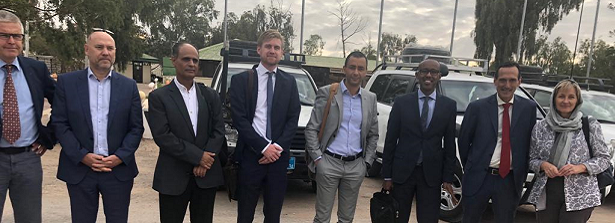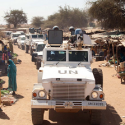Scoping mission to implement UNSCR 2417 on hunger and conflict in Horn of Africa

From November 10 to 22, 2018, the Ministry of Foreign Affairs (MinFA) initiated a scoping mission to Sudan (Darfur) and Somalia (Somaliland) in cooperation with the Food and Agriculture Organization of the United Nations (UN-FAO). The mission was joined by the Wageningen Centre for Development Innovation, part of WUR, and the Food & Business Knowledge Platform. Purpose of the mission was to inform an upcoming regional Food & Nutrition Security REsilience PROgramme (FNS-REPRO) that intends to operationalize and implement United Nations Security Council (UNSC) Resolution 2417 on hunger and conflict in the Horn of Africa.
The resolution was triggered by the rise in worldwide hunger that has continued for the past years, driven mainly by violent conflict, and condemns the starvation of civilians as a method of warfare while calling for the protection of food systems in conflict-affected contexts. The F&BKP joined the mission to explore how its intended learning component could link up to the activities organized under the Community of Practice on food security and stability.
FNS-REPRO
Both in Darfur and Somaliland conflict has weakened the food production system and degraded the natural resource base through the coping strategies of people and communities facing recurrent shocks – that over the years have ranged from conflict to droughts and floods. The upcoming Food & Nutrition Security REsilience PROgramme (FNS-REPRO) strives to implement an innovative approach focused on food systems in areas of instability, linking interventions along the humanitarian-development continuum to strengthen the resilience of households, communities and especially the food systems on which their livelihoods depend to future shocks.
| United Nations Security Council Resolution 2417 |
| UNSC Resolution 2417 condemns starvation of civilians as a method of warfare while a key element of the resolution urges parties to ensure the proper functioning of food systems and markets in situations of armed conflict. It names objects necessary for food production and distribution such as farms, markets, water systems, mills, food processing and storage sites, and hubs and means for food transportation. It also names objects indispensable to the survival of the civilian population, such as foodstuffs, crops, livestock, agricultural assets, drinking water installations and supplies and irrigation works. |
North Darfur
In North Darfur the mission visited (I)NGOs and project sites working on livelihood recovery and resilience in agriculture, agroforestry and livestock. Before the conflict hit Darfur it was self-sufficient in food production and even exported food products. Currently it imports 40% of its food requirements and faces a significantly degraded resource base partly as a result of overexploitation during the conflict and crisis. Much programming in the area is still primarily humanitarian, where communities for instance build water catchments in return for cash. As relative stability returns there are humanitarian initiatives that have potential to support economic development and more market based activity.

Photo left: Seed storage that had until recently served as ammunition storage for a rebel group.
Photo right: Sesame seed harvest from a demonstration farm, intercropped in a Gum Arabic forest and managed by a women-led CBO.
Somaliland
In Somaliland the mission visited project and commercial sites along the livestock value chain which is the backbone of the food system and economy of Somaliland with around 60% of households depending on it. Currently, rangelands are overexploited and degraded through traditional livestock keeping because the number of animals in the landscape is too high. Repeated shocks, in particular droughts, have also seriously impacted livelihoods – it is estimated that between 60-70% of livestock perished during the 2016-17 drought. Moreover, as a result of conflict livestock keepers’ ability to pursue long-range grazing strategies has been reduced, increasing pressure on rangelands and conflict over access to grazing lands and water points. Humanitarian projects supporting livestock holders were therefore visited, with potential to link up livestock holders to national and regional value chains.

Photo left: Dairy market in Hargeisa managed by a women-led CBO.
Photo right: Fodder production from seed pods of the invasive Prosopis juliflora tree in a cash for work project.
CoP on food security and stability
The regional programme this scoping mission informs will start implementation during the course of 2019. Learning will be an important and integral component to the FNS-REPRO programme with a particular focus on how to build food systems resilience in the face of crises and conflict. The learning process will be led by Wageningen Centre for Development Innovation, part of WUR, and UN-FAO and while F&BKP looks to contribute knowledge brokering expertise where relevant and looks to connect learning in the programme to the ongoing activities of the Community of Practice on food security and stability. To this purpose the F&BKP will contribute to ongoing discussions by the MinFA and UN-FAO, specifically in discussions on how the learning activities by UN-FAO and Wageningen Centre for Development Innovation, part of WUR, can be complemented by F&BKP activities.






